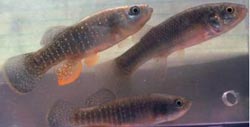Warmer oceans could raise mercury levels in fish

Dartmouth and other researchers studied killifish under varying temperatures in the lab and in salt marsh pools in Maine. Credit: NOAA<br>
Rising ocean surface temperatures caused by climate change could make fish accumulate more mercury, increasing the health risk to people who eat seafood, Dartmouth researchers and their colleagues report in a study in the journal PLOS ONE.
Until now, little has been known about how global warming may affect mercury bioaccumulation in marine life, and no previous study has demonstrated the effects using fish in both laboratory and field experiments. Mercury released into the air through industrial pollution can accumulate in streams and oceans and is turned into methylmercury in the water.
The researchers studied killifish under varying temperatures in the lab and in salt marsh pools in Maine. Fish in the marshes ate insects, worms and other natural food sources, while the lab fish were fed mercury-enriched food.
Results showed the fish in warmer waters ate more but grew less and had higher methylmercury levels in their tissues, suggesting increases in their metabolic rate caused the increased uptake of the toxic metal.
Broadcast studios: Dartmouth has TV and radio studios available for interviews. For more information, visit: http://www.dartmouth.edu/~opa/radio-tv-studios/
Media Contact
More Information:
http://www.dartmouth.eduAll latest news from the category: Ecology, The Environment and Conservation
This complex theme deals primarily with interactions between organisms and the environmental factors that impact them, but to a greater extent between individual inanimate environmental factors.
innovations-report offers informative reports and articles on topics such as climate protection, landscape conservation, ecological systems, wildlife and nature parks and ecosystem efficiency and balance.
Newest articles

Economies take off with new airports
A global study by an SUTD researcher in collaboration with scientists from Japan explores the economic benefits of airport investment in emerging economies using nighttime satellite imagery. Be it for…

CAR T–cell immunotherapy targets
Pan-cancer analysis uncovers a new class of promising CAR T–cell immunotherapy targets. Scientists at St. Jude Children’s Research Hospital found 156 potential CAR targets across the brain and solid tumors,…

Stony coral tissue loss disease
… is shifting the ecological balance of Caribbean reefs. The outbreak of a deadly disease called stony coral tissue loss disease is destroying susceptible species of coral in the Caribbean…





















